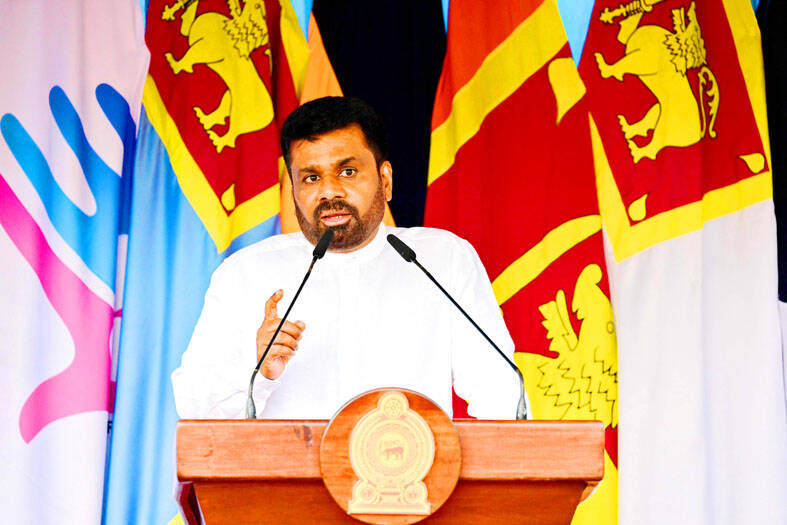Sri Lanka’s independent regulator has sacked a senior police officer for failing to prevent the 2019 Easter Sunday bombings, which killed 279 people including 45 foreigners.
Sri Lanka’s National Police Commission dismissed Senior Deputy Inspector General of Police Nilantha Jayawardena, then chief of the Sri Lankan State Intelligence Service (SIS), disregarding prior warnings of an impending attack by Islamic extremists.
Court records show that Jayawardena had been alerted to a possible terror strike 17 days before the coordinated suicide attacks on April 21, 2019, which targeted three hotels and three churches.

Photo: AFP
More than 500 people were also wounded in the bombings.
Jayawardena had been found guilty on all seven counts of negligence and dereliction of duty by a disciplinary inquiry led by a retired judge, the police commission said in a statement late on Saturday.
“Considering the gravity of the charges, the Commission decided to give him the maximum punishment,” the statement said.
Following the Easter bombings, Sri Lanka’s worst terror attack on civilians, Jayawardena was removed from his position as SIS chief, but was elevated to the role of deputy head of the police force, overseeing administration.
However, he was placed on compulsory leave a year ago, pending a disciplinary hearing, after repeated judicial orders to take action against him.
A top-level investigation initiated shortly after the attack found that then-Sri Lankan president Maithripala Sirisena and four of his senior officials, including Jayawardena, should face criminal prosecution for their lapses.
In accordance with Sri Lankan Supreme Court orders issued in January 2023 following a civil case, they have paid just over US$1 million in damages to the victims.
The 2019 bombings were blamed on a local jihadi group that pledged allegiance to the Islamic State.
Sri Lankan President Anura Kumara Dissanayake has vowed to step up investigations into the Easter attacks and uncover those responsible for the bombings.

Nauru has started selling passports to fund climate action, but is so far struggling to attract new citizens to the low-lying, largely barren island in the Pacific Ocean. Nauru, one of the world’s smallest nations, has a novel plan to fund its fight against climate change by selling so-called “Golden Passports.” Selling for US$105,000 each, Nauru plans to drum up more than US$5 million in the first year of the “climate resilience citizenship” program. Almost six months after the scheme opened in February, Nauru has so far approved just six applications — covering two families and four individuals. Despite the slow start —

North Korean troops have started removing propaganda loudspeakers used to blare unsettling noises along the border, South Korea’s military said on Saturday, days after Seoul’s new administration dismantled ones on its side of the frontier. The two countries had already halted propaganda broadcasts along the demilitarized zone, Seoul’s military said in June after the election of South Korean President Lee Jae-myung, who is seeking to ease tensions with Pyongyang. The South Korean Ministry of National Defense on Monday last week said it had begun removing loudspeakers from its side of the border as “a practical measure aimed at helping ease

DEADLY TASTE TEST: Erin Patterson tried to kill her estranged husband three times, police said in one of the major claims not heard during her initial trial Australia’s recently convicted mushroom murderer also tried to poison her husband with bolognese pasta and chicken korma curry, according to testimony aired yesterday after a suppression order lapsed. Home cook Erin Patterson was found guilty last month of murdering her husband’s parents and elderly aunt in 2023, lacing their beef Wellington lunch with lethal death cap mushrooms. A series of potentially damning allegations about Patterson’s behavior in the lead-up to the meal were withheld from the jury to give the mother-of-two a fair trial. Supreme Court Justice Christopher Beale yesterday rejected an application to keep these allegations secret. Patterson tried to kill her

CORRUPTION PROBE: ‘I apologize for causing concern to the people, even though I am someone insignificant,’ Kim Keon-hee said ahead of questioning by prosecutors The wife of South Korea’s ousted former president Yoon Suk-yeol yesterday was questioned by a special prosecutor as investigators expanded a probe into suspicions of stock manipulation, bribery and interference in political party nominations. The investigation into Kim Keon-hee is one of three separate special prosecutor probes launched by the government targeting the presidency of Yoon, who was removed from office in April and rearrested last month over his brief imposition of martial law on Dec. 3 last year. The incident came during a seemingly routine standoff with the opposition, who he described as “anti-state” forces abusing their legislative majority to obstruct